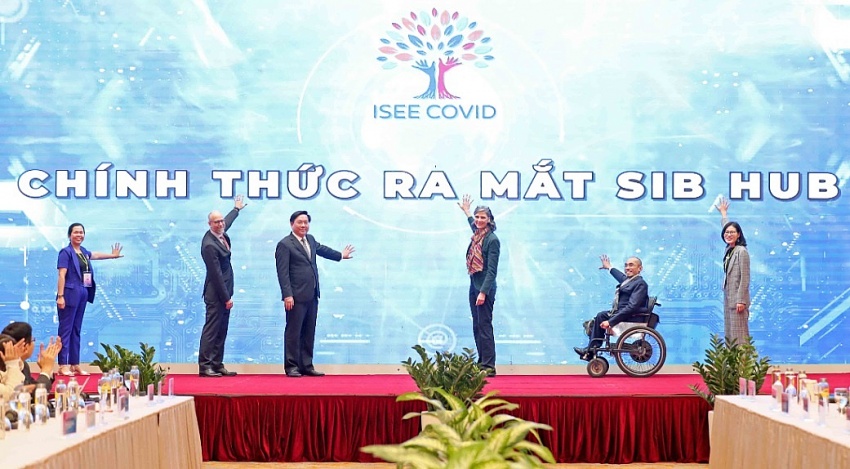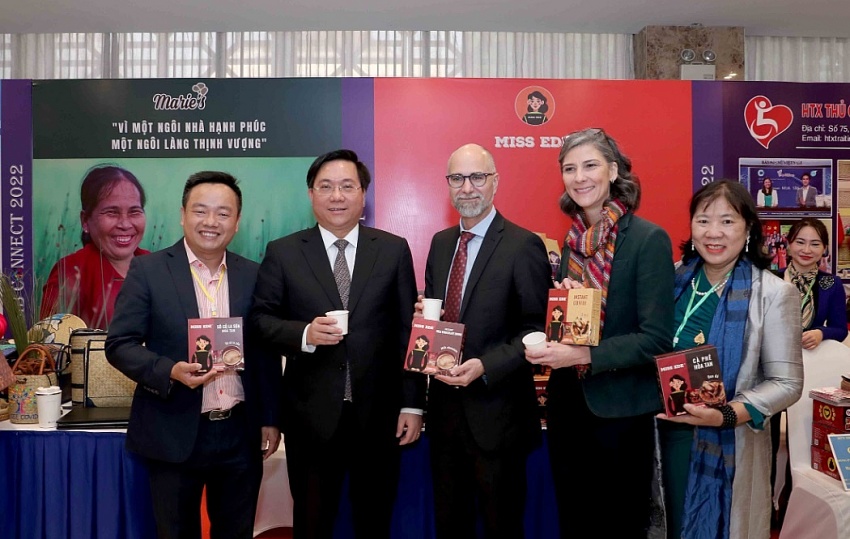SIB Connect gathers businesses and investors for greater social impact
 |
In Vietnam, around 22,000 enterprises are classified as social impact businesses (SIBs). Those that are led by or work with vulnerable groups such as women, ethnic minorities, people with disabilities, and diverse gender groups are facing multiple challenges in developing sustainable business models to balance between making profits and creating social impacts.
The main challenges that they are facing include lack of capital, lack of information and product market, and lack of knowledge and skills on corporate governance. In addition, they must cope with external challenges, including the negative impact of the pandemic, lack of support from intermediaries, the weak connection of stakeholders in the ecosystem, lack of social awareness, and above all, lack of a supportive policy framework.
On the government’s policies to support the SIB community in the coming period, Deputy Minister of Planning and Investment Tran Duy Dong said, “On the way to achieve the sustainable development goals, social impact business is the vital factor, contributing to economic development, at the same time creating positive impacts on society and the environment by creating jobs and providing products and services to vulnerable groups."
However, compared to commercial businesses, SIB enterprises face more difficulties due to their particularities.
Although there is no specific policy for social impact businesses, the government encourages and appreciates SIBs. With that, the Ministry of Planning and Investment (MPI) has implemented programmes and activities to support disadvantaged groups in society.
With the support of Global Affairs Canada and the United Nations Development Programme (UNDP), the MPI is actively implementing the ISEE-COVID project.
 |
| “SIB Connect is an opportunity for us to celebrate the achievements of social impact businesses and ecosystem actors after a year filled with challenges. Yet the resilience and relevance of the SIBs were best demonstrated precisely in this context of uncertainty, where SIBs were quick to turn their business activities around,” said Ramla Khalidi. |
The initiative is tackling the interconnected and systemic challenges that SIBs are facing. In 2022, the ISEE-COVID project focused on improving the capacity of SIBs, providing seed funding, building the capacity of and coordination between SIB intermediaries, and strengthening government policymaking capacities for enabling such businesses.
Through the COVID-19 Adaptation Programme, the project has provided seed funding and six-month one-on-one coaching for 31 SIBs to develop and test new business models, products, and services. These groups are reporting increased revenue, new products, and new jobs created for vulnerable people. Many of them are also led by and employ women, persons with disabilities, and LGBTIQ people.
In addition, more than 200 SIBs have benefited from training and capacity-building activities, investment promotion, and market access. The SIB Innovation Champion programme, meanwhile, has trained nearly 60 individual champions, who in turn provide free coaching for 120 SIBs. The project has supported three intermediary organisations to develop and roll out their own peer-to-peer training and coaching activities for more than 100 members.
UNDP resident representative for Vietnam Ramla Khalidi commended the advances made by social impact businesses and the development of the ecosystem that supports SIBs over the past year.
“SIB Connect is an opportunity for us to celebrate the achievements of social impact businesses and ecosystem actors after a year filled with challenges. The resilience and relevance of the SIBs were best demonstrated precisely in this context of uncertainty, where they were quick to turn their business activities around,” she said.
Addressing the event, Ambassador of Canada to Vietnam Shawn Steil said, “Canada’s development cooperation programme in part aims to help catalyse private capital to support sustainable and inclusive economic development. The ISEE-COVID project highlights Canada’s commitment to promoting gender equality. The project is also responsive to the government of Vietnam's poverty reduction priorities by supporting inclusive economic development, with a particular focus on small- and medium-sized enterprises."
The ISEE-COVID project is expected to continue to support the SIB ecosystem in Vietnam in 2023 and 2024, and the community is encouraged to participate in various activities and funding packages moving forward.
What the stars mean:
★ Poor ★ ★ Promising ★★★ Good ★★★★ Very good ★★★★★ Exceptional
Related Contents
Latest News
More News
- Vietnamese businesses diversify amid global trade shifts (February 03, 2026 | 17:18)
- Consumer finance sector posts sharp profit growth (February 03, 2026 | 13:05)
- Vietnam and US to launch sixth trade negotiation round (January 30, 2026 | 15:19)
- NAB Innovation Centre underscores Vietnam’s appeal for tech investment (January 30, 2026 | 11:16)
- Vietnam moves towards market-based fuel management with E10 rollout (January 30, 2026 | 11:10)
- Vietnam startup funding enters a period of capital reset (January 30, 2026 | 11:06)
- Vietnam strengthens public debt management with World Bank and IMF (January 30, 2026 | 11:00)
- PM inspects APEC 2027 project progress in An Giang province (January 29, 2026 | 09:00)
- Vietnam among the world’s top 15 trading nations (January 28, 2026 | 17:12)
- Vietnam accelerates preparations for arbitration centre linked to new financial hub (January 28, 2026 | 17:09)

 Tag:
Tag:


























 Mobile Version
Mobile Version